Q&A: The Global ‘Trade War’ Over China’s Booming EV Industry
What’s Causing the Controversy?
The global electric vehicle (EV) industry has been facing a growing “trade war” over China’s booming EV market. The issue revolves around the Chinese government’s policies, which are perceived as favoring local companies and stifling foreign competition.
The Chinese Government’s Role
China has been aggressively promoting its domestic EV industry through a series of policies and incentives, including subsidies, tax breaks, and preferential financing. These measures have enabled Chinese companies to dominate the domestic market, with major players like BYD, Geely, and Great Wall Motor emerging as industry leaders.
The Concerns of Foreign Manufacturers
However, foreign automakers like Volkswagen, BMW, and Tesla have been vocal about the unfair playing field in China. They argue that the Chinese government’s policies are discriminatory and limit their ability to compete fairly. For instance, foreign companies are subject to higher tariffs and stricter environmental regulations compared to their Chinese counterparts.
The Impact on Global Trade
The tensions between China and foreign manufacturers have implications for global trade. A trade war over the EV industry could lead to increased tariffs, restrictions on trade, and retaliatory measures. This could disrupt global supply chains, affect investment flows, and impact consumer choice.
What’s the International Response?
Several countries and international organizations have expressed concerns over China’s policies and have called for a more level playing field. The United States, the European Union, and Japan have been vocal critics of China’s actions, and have demanded greater access to the Chinese market.
International Cooperation and Negotiations
In response, China has offered to increase market access and has agreed to negotiate with foreign countries. The Chinese government has also pledged to reduce tariffs and implement new regulations to promote fair competition.
Industry-Wide Concerns and Opportunities
The controversy has also led to increased scrutiny of the EV industry’s sustainability and environmental impact. As governments and companies navigate the trade tensions, there are concerns about the long-term viability of the industry and the need for more sustainable solutions.
Conclusion
The global “trade war” over China’s booming EV industry highlights the complexities of international trade and the challenges of promoting sustainable development. As governments and companies navigate the complexities, it is essential to prioritize fair competition, sustainable practices, and cooperation to ensure a prosperous and environmentally friendly future.
FAQs
Q: What is the main issue at stake in the trade war over China’s EV industry?
A: The main issue is China’s government policies, which are perceived as favoring local companies and stifling foreign competition.
Q: Which foreign automakers are critical of China’s policies?
A: Volkswagen, BMW, and Tesla have been vocal about the unfair playing field in China.
Q: What are the implications for global trade?
A: A trade war over the EV industry could lead to increased tariffs, restrictions on trade, and retaliatory measures, disrupting global supply chains and affecting investment flows.
Q: What is China’s response to the international criticism?
A: China has offered to increase market access and has agreed to negotiate with foreign countries, pledging to reduce tariffs and implement new regulations to promote fair competition.
Q: What are the long-term implications for the EV industry?
A: The controversy highlights the need for sustainable solutions and cooperation to ensure a prosperous and environmentally friendly future for the industry.



.png?w=150&resize=150,150&ssl=1)



.png?w=150&resize=150,150&ssl=1)